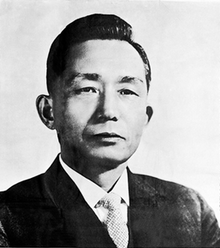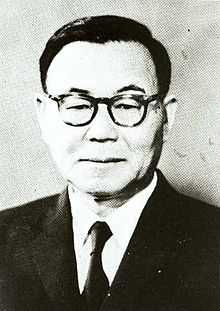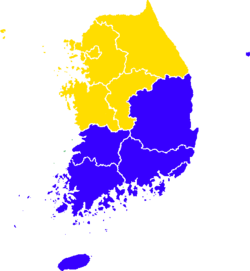South Korean presidential election, 1963
The first presidential elections in South Korea since the 1961 May Coup took place on 15 October 1963.[1] The result was a narrow victory for the acting incumbent and leader of the governing military Supreme Council for National Reconstruction, Park Chung Hee, who won 46.6% of the vote, securing a transition to civilian rule under his Democratic Republican Party. Voter turnout was 85.0%.[2]
Results
Summary of the 15 October 1963 South Korean presidential election results
| Candidate |
Party |
Votes |
% |
| Park Chung-hee |
Democratic Republican Party |
4,702,640 |
46.6 |
|
| Yun Bo-seon |
Civil Rule Party |
4,546,614 |
45.1 |
|
| Oh Jae-yeong |
Independent |
408,664 |
4.1 |
|
| Byun Young-tae |
Righteous Citizens Party |
224,442 |
2.2 |
|
| Jang I-seok |
New Development Party |
198,837 |
2.0 |
|
| Total (Turnout: 85.0%) |
11,036,175 |
100.0 |
| Source: Nohlen et al |
Provincial results
| Province or city |
Park Chung Hee |
Yun Bo-seon |
Oh Jae-young |
Byun Young-tae |
Jang I-seok |
Total |
|---|
| Votes |
% |
Votes |
% |
Votes |
% |
Votes |
% |
Votes |
% |
| Seoul |
371,627 |
(30.1%) |
802,052 |
(65.1%) |
20,634 |
(1.6%) |
26,728 |
(2.2%) |
10,537 |
(0.9%) |
1,231,578 |
 |
| Gyeonggi |
384,764 |
(33.1%) |
661,984 |
(56.9%) |
54,770 |
(4.7%) |
34,775 |
(3.0%) |
27,554 |
(2.4%) |
1,163,847 |
 |
| Gangweon |
296,711 |
(40.0%) |
368,092 |
(49.1%) |
35,568 |
(4.7%) |
24,924 |
(3.3%) |
24,528 |
(3.3%) |
749,823 |
 |
| Chungnam |
405,077 |
(40.8%) |
490,663 |
(49.4%) |
47,364 |
(4.8%) |
26,639 |
(2.7%) |
23,359 |
(2.4%) |
993,102 |
 |
| Chungbuk |
202,789 |
(39.8%) |
249,397 |
(48.9%) |
26,911 |
(5.3%) |
15,699 |
(3.1%) |
14,971 |
(2.9%) |
509,767 |
 |
| Jeonnam |
765,712 |
(57.2%) |
480,800 |
(35.9%) |
51,714 |
(3.9%) |
17,312 |
(1.3%) |
22,604 |
(1.7%) |
1,338,142 |
 |
| Jeonbuk |
408,556 |
(49.4%) |
343,171 |
(41.5%) |
27,906 |
(3.4%) |
18,617 |
(2.3%) |
18,223 |
(2.2%) |
826,473 |
 |
| Busan |
242,779 |
(48.2%) |
239,038 |
(47.5%) |
11,214 |
(2.2%) |
7,106 |
(1.4%) |
3,419 |
(0.7%) |
503,601 |
 |
| Gyeongnam |
706,079 |
(61.7%) |
341,971 |
(29.9%) |
60,645 |
(5.3%) |
19,323 |
(1.7%) |
26,014 |
(2.3%) |
1,144,032 |
 |
| Gyeongbuk |
837,124 |
(55.6%) |
543,392 |
(36.1%) |
58,079 |
(3.9%) |
31,113 |
(2.1%) |
34,622 |
(2.3%) |
1,504,330 |
 |
| Jeju |
81,422 |
(70.0%) |
26,009 |
(22.3%) |
3,859 |
(3.3%) |
2,207 |
(1.9%) |
3,006 |
(2.6%) |
116,503 |
 |
References
- ↑ Nohlen, D, Grotz, F & Hartmann, C (2001) Elections in Asia: A data handbook, Volume II, p420 ISBN 0-19-924959-8
- ↑ Nohlen, D, Grotz, F & Hartmann, C (2001) Elections in Asia: A data handbook, Volume II, p464 ISBN 0-19-924959-8
|
|---|
| | Presidential elections | |
|---|
| | Legislative elections | |
|---|
| | Local elections |
- 1952
- 1956
- 1960
- 1991
- 1995
- 1998
- 2002
- 2006
- 2010
- 2014
- 2018
|
|---|
| | By-elections |
- 1997
- 1998
- 1999
- 2000
- 2001
- 2002
- 2003
- 2004
- 2005
- 2006
- 2007
- 2008
- 2009
- 2010
- 2011
- 2012
- 2013
- 2014
|
|---|
| | Referendums | |
|---|
|













